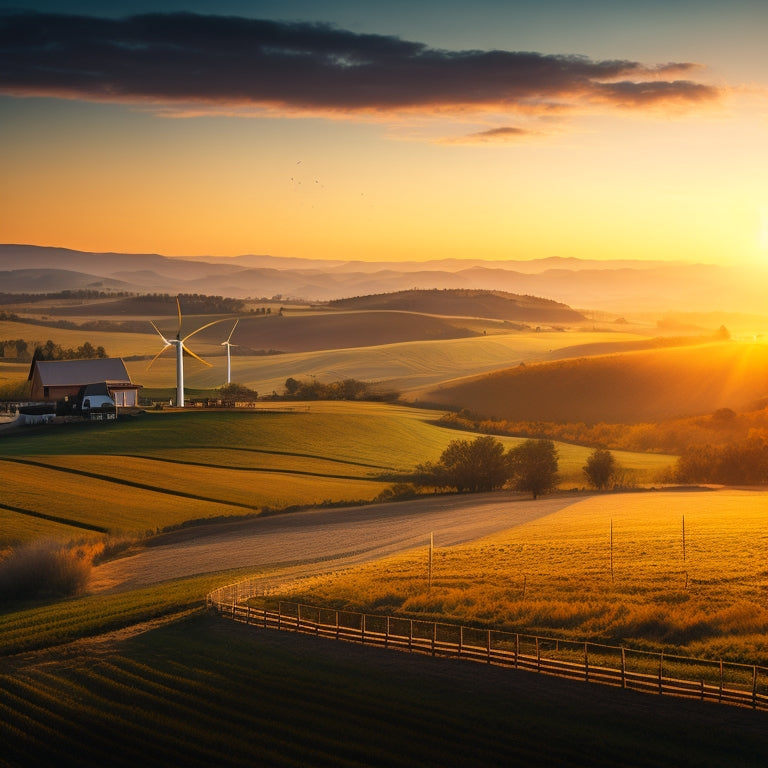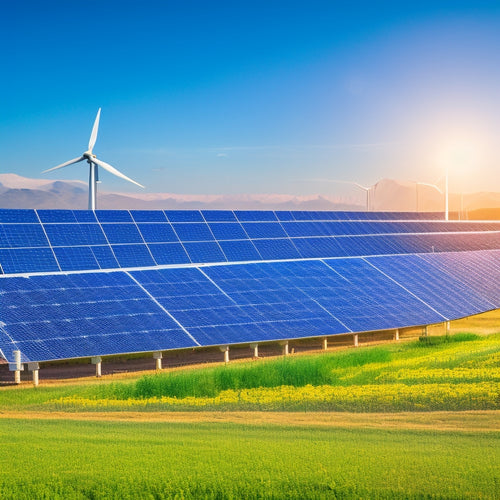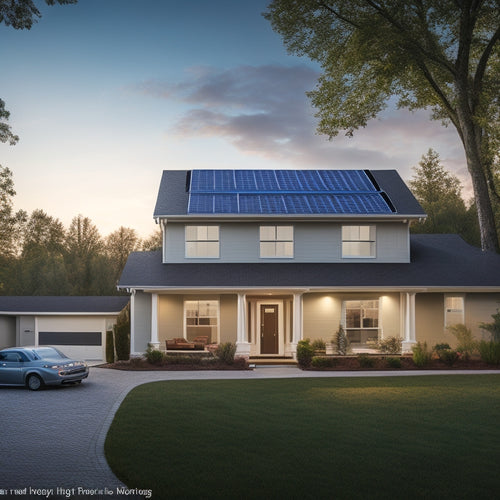
Why Rural Areas Need Off-Grid Energy Solutions
Share
When you live in a rural area, you're likely familiar with the struggles of energy poverty and inequality. Off-grid energy solutions can be a game-changer, providing access to sustainable, renewable energy sources like solar, wind, and hydro power. This not only helps reduce your reliance on fossil fuels but also mitigates environmental impacts. By shifting to off-grid solutions, you can achieve energy independence, lower energy costs, and improve reliability. Plus, it's an essential step towards bridging the energy access gap in rural areas. As you explore off-grid energy solutions, you'll discover more about the benefits and opportunities they offer – and how they can empower rural communities like yours.
Key Takeaways
• Off-grid energy solutions help combat energy poverty in rural areas, where access to energy is limited and often unaffordable.
• Renewable energy sources like solar, wind, and hydro power reduce reliance on fossil fuels, mitigating environmental impacts and promoting sustainability.
• Off-grid solutions enhance rural electrification, providing energy independence and promoting economic development in marginalized communities.
• Decentralized energy generation and mini-grids reduce the need for costly transmission lines, making energy more accessible and affordable for rural residents.
• Off-grid energy solutions create job opportunities, stimulate local economies, and bridge the energy access gap in rural areas, empowering communities to thrive.
Renewable Energy for Rural Communities
Rural communities can harness renewable energy sources, such as solar, wind, and hydro power, to reduce their reliance on fossil fuels and mitigate the environmental impacts of traditional energy generation. As you explore off-grid energy solutions, you'll find that renewable energy can be a game-changer for rural electrification. By leveraging these clean energy sources, rural communities can reduce their carbon footprint and create a more sustainable future.
Community engagement is vital in driving the adoption of renewable energy in rural areas. You'll need to educate and involve local residents in the planning and implementation process to make sure that the solutions meet their specific needs. This collaborative approach won't only increase community buy-in but also foster a sense of ownership and responsibility for the project's success.
Overcoming Energy Inequality
As you explore off-grid energy solutions for rural areas, you'll likely encounter the pressing issue of energy inequality.
You'll notice that energy poverty rates are disproportionately high in rural communities, where limited grid access exacerbates the problem.
Moreover, you'll find that unequal resource distribution is a significant contributor to this energy inequality, and addressing these disparities is crucial to guarantee equal access to energy.
Energy Poverty Rates
Energy poverty rates persistently plague marginalized communities, with an estimated 840 million people worldwide lacking access to electricity, and you're likely to find the most egregious examples in rural areas.
As you investigate further, you'll discover that energy poverty is often intertwined with rural demographics. In these areas, energy affordability is a significant concern, as residents struggle to allocate a substantial portion of their income towards energy expenditures. This issue is further exacerbated by the lack of access to modern energy services, hindering economic development and perpetuating the cycle of poverty.
You'll notice that rural areas often have limited access to energy-efficient technologies, making them reliant on expensive and polluting energy sources. To address energy inequality, developing innovative, off-grid energy solutions tailored to the unique needs of rural demographics is crucial.
Limited Grid Access
You'll often find that the main obstacle to electrification in rural areas is the limited grid access, which stems from inadequate infrastructure and high installation costs. This limitation hinders the expansion of grid networks, leaving many rural communities in the dark. The high cost of extending the grid to rural areas, combined with the low population density, makes it unviable for utilities to invest in grid expansion.
Some of the key challenges of limited grid access include:
-
Rural isolation: The geographical dispersion of rural communities makes it difficult to connect them to the grid.
-
High infrastructure costs: Building and maintaining grid infrastructure in rural areas is costly due to the long distances and low population density.
-
Low demand: The low demand for electricity in rural areas makes it unprofitable for utilities to invest in grid expansion.
- Technical difficulties: The harsh terrain and weather conditions in rural areas pose technical challenges to grid installation and maintenance.
Off-grid energy solutions can help bridge the energy gap in rural areas, providing a reliable and sustainable alternative to grid expansion.
Unequal Resource Distribution
Roughly 80% of those without access to electricity worldwide reside in rural areas, where unequal resource distribution exacerbates the existing energy deficits. You'd think that with modernization, energy access would be more equitable, but the truth is, rural areas are often the last to receive critical infrastructure investments.
As a result, you're more likely to find food deserts in rural areas, where fresh produce is scarce, and energy-intensive agriculture is a luxury. This uneven distribution of resources also perpetuates the digital divide, where rural communities lack reliable internet access, hindering their ability to participate in the digital economy.
The consequences of unequal resource distribution are far-reaching. Without reliable energy, rural areas struggle to attract businesses, creating a vicious cycle of poverty and underdevelopment. Moreover, the lack of access to energy-efficient technologies and renewable energy sources means that rural communities are often forced to rely on polluting, expensive energy sources, further exacerbating environmental degradation and health problems.
It's essential to recognize that unequal resource distribution is a significant obstacle to overcoming energy inequality in rural areas. By acknowledging this, we can start working towards innovative, off-grid energy solutions that address the unique needs of rural communities.
Off-Grid Energy Independence
As you explore off-grid energy independence, you'll find that renewable energy options are essential to achieving self-sufficiency.
You'll need to assess which renewable sources, such as solar, wind, or hydro power, are viable for your specific rural area.
Renewable Energy Options
When considering off-grid energy solutions, it's crucial to explore the various renewable energy options available. These options not only reduce your carbon footprint but also provide a reliable source of energy.
Some key benefits of renewable energy options include:
-
Energy Storage: Renewable energy systems can be paired with energy storage solutions, ensuring a stable and consistent energy supply.
-
Community Engagement: Community-based renewable energy projects encourage community engagement and ownership, fostering a sense of responsibility and pride in the energy system.
-
Reduced Energy Costs: Renewable energy options can greatly decrease energy costs, making them an attractive solution for rural communities.
- Increased Energy Reliability: Renewable energy systems can provide a dependable source of energy, reducing the likelihood of power outages and disruptions.
Energy Self-Sufficiency Systems
By integrating renewable energy options with energy storage and management systems, you can create an energy self-sufficiency system that provides off-grid energy independence for rural communities. This approach allows you to generate, store, and manage your own energy, reducing reliance on the grid and enhancing grid resilience. Energy self-sufficiency systems democratize energy access, empowering rural communities to take control of their energy needs.
| Benefits | Description |
|---|---|
| Energy Independence | Reduce reliance on the grid and enhance energy security |
| Cost Savings | Lower energy costs through reduced transmission and distribution losses |
| Increased Reliability | Secure a stable energy supply, even during grid outages |
| Environmental Benefits | Reduce carbon footprint and promote sustainable energy practices |
| Community Empowerment | Foster energy democratization and community-led energy initiatives |
Environmental Impact of Fossil Fuels
Fossil fuel combustion releases massive amounts of carbon dioxide, methane, and other pollutants into the atmosphere, which you directly contribute to through your daily energy consumption. Your daily habits, from turning on the lights to charging your devices, have a profound impact on the environment. The consequences of this pollution are far-reaching and devastating.
Here are just a few of the environmental impacts of fossil fuel combustion:
-
Climate Change: The release of greenhouse gases, such as carbon dioxide and methane, contributes to global warming and climate change.
-
Air Pollution: Fossil fuel combustion releases pollutants like particulate matter, nitrogen oxides, and sulfur dioxide, which can cause respiratory problems and other health issues.
-
Water Pollution: Oil spills, fracking, and other fossil fuel extraction methods can contaminate water sources, harming aquatic ecosystems.
- Land Degradation: Drilling, mining, and drilling for fossil fuels can damage ecosystems and wildlife habitats.
The environmental impact of fossil fuels is undeniable. It's time to rethink our energy options and consider off-grid energy solutions that are cleaner, more sustainable, and better for the planet.
Cost-Effective Energy Alternatives
As you weigh your energy options, you'll find that decentralized, off-grid energy solutions can be more cost-effective than traditional grid-tied systems, especially for rural areas. By leveraging advances in energy storage and mini grids, you can create a reliable and efficient energy infrastructure that's tailored to your specific needs.
Off-grid energy solutions eliminate the need for expensive transmission lines and infrastructure, reducing the overall cost of energy production and distribution. Additionally, decentralized energy systems can be designed to meet the unique energy demands of rural communities, ensuring that energy is produced and consumed locally.
Energy storage systems, such as batteries, enable you to store excess energy generated during the day for use during periods of low energy production. This reduces the reliance on fossil fuels and minimizes energy waste.
Mini grids, on the other hand, allow you to create a local energy network that can be scaled up or down depending on energy demand. By combining energy storage and mini grids, you can create a resilient and cost-effective energy system that meets the unique needs of rural areas.
Solar Power for Rural Development
You can harness the abundant solar energy in rural areas to power homes, schools, and healthcare facilities, alleviating energy poverty and stimulating local economic growth. By leveraging solar innovations, rural areas can bridge the energy access gap, fostering rural connectivity and development.
Here are some key benefits of solar power for rural development:
-
Decentralized energy generation: Solar panels can be installed on rooftops or in community-based solar gardens, providing energy independence to rural communities.
-
Reduced energy costs: Solar energy can markedly lower energy expenditures, freeing up resources for other essential services like healthcare and education.
-
Enhanced rural connectivity: Solar-powered telecommunications infrastructure can improve communication services, connecting rural communities to the global economy.
- Job creation and local economic growth: The solar industry can create new job opportunities, stimulate local entrepreneurship, and increase economic activity in rural areas.
Empowering Rural Communities Through Energy
Rural electrification through off-grid energy solutions can reveal the full potential of rural communities, enabling them to overcome the constraints of energy poverty and thrive in a connected global economy. You can be part of this transformative process by empowering rural communities through energy. By providing reliable and sustainable energy access, you can disclose their economic potential, improve their well-being, and bridge the rural-urban divide.
Through community outreach programs, you can educate rural residents about the benefits of off-grid energy solutions, addressing their specific needs and concerns. This targeted approach enables you to build trust and foster collaboration, ensuring that energy projects are tailored to local contexts.
By building rural capacity, you can create a self-sustaining ecosystem where local communities take ownership of their energy future. This capacity building can involve training and skills development, enabling rural residents to manage and maintain their own energy infrastructure.
Frequently Asked Questions
Can Off-Grid Energy Solutions Be Used in Areas With Limited Sunlight?
Did you know that 1 in 5 people globally lack access to electricity? You'll be relieved to know that off-grid energy solutions can thrive in areas with limited sunlight, thanks to advanced energy storage systems, which compensate for cloudy regions' reduced solar output.
How Do Off-Grid Energy Solutions Impact Local Wildlife Habitats?
As you deploy off-grid energy solutions, you're likely to disrupt local ecosystems, causing habitat fragmentation and altering species' habits, so it's important to assess and mitigate these impacts to preserve biodiversity and ecosystem balance.
Are Off-Grid Energy Solutions More Expensive Than Traditional Energy Sources?
You'll find that off-grid energy solutions' cost comparison to traditional sources reveals a complex picture; while upfront costs may be higher, long-term economic viability is often improved through reduced maintenance and fuel costs.
Can Off-Grid Energy Solutions Be Used to Power Small Businesses?
As you spark entrepreneurial spirit in rural landscapes, you'll discover that off-grid energy solutions can indeed power small businesses, fostering economic empowerment and rural prosperity through reliable, sustainable energy, opening up opportunities for local growth.
Do Off-Grid Energy Solutions Require Frequent Maintenance?
You'll find that off-grid energy solutions don't require frequent maintenance, but regular energy audits and system checks are essential to guarantee peak performance and identify potential issues before they become major problems.
Related Posts
-

The Role of Battery Monitoring Systems in Renewable Energy
Battery monitoring systems play an essential role in renewable energy by enhancing system longevity and optimizing pe...
-

Cost of Solar With Battery Backup
You're investing in a solar panel system with battery backup to guarantee reliable power during outages. The cost of ...
-

Essential Hiking Lights for Safety and Fun
When you're hitting the trails, essential hiking lights are vital for safety and fun. A lightweight headlamp offers h...


